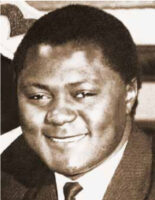
Thomas Joseph Mboya will be remembered as one of the most charismatic and most flamboyant Cabinet Ministers Kenya has had. At independence in 1963, he was appointed the Minister for Justice and Constitutional Affairs. In 1965, he was moved to the Ministry of Economic Planning.
TJ, as he was popularly known, was born on August 15, 1930, the eldest son of Leonard Ndiege and Marcela Awuor who hailed from Rusinga Island in Nyanza Province. His parents valued education and, though they were labourers in a sisal farm in Kilimambogo, near Thika, they ensured he was educated at Catholic mission schools.
Mboya started school at the age of nine. His father sent him to a mission primary school in Machakos run by an Irish priest where he remained for three years. In 1942, he moved to St Mary’s Mission School, Yala, Nyanza. It was while at St Mary’s that he began learning English and history. The slogan, “No taxation without representation” of colonial American fame, was lodged in his mind at a young age. He passed the Kenya African Primary Examination in 1945, and joined Holy Ghost College (Mangu), a leading Catholic school in Central Province, in 1946. Mboya was one of the school’s leading debaters and actors, playing Mark Twain.
He was fond of Western rhetoric, and admired French Emperor Napoleon Bonaparte, US President Abraham Lincoln and black civil rights leader Booker T. Washington. Mboya read and re-read British Prime Minister Winston Churchill’s wartime speeches among others. Unfortunately, his meagre resources ran out in his final year and he was unable to sit the national examination that would have made him qualify to join a university. But that did not dampen his spirit to make something out of his life.
In 1948, he joined the Royal Sanitary Institute’s Medical Training School for sanitary inspectors, and qualified as inspector in 1950. He then worked for the Nairobi City Council for two and a half years. He resigned to become the general secretary of the Kenya Government Workers Union, which he had formed.
He later joined the Nairobi African Local Government Servants Association and within a year was elected vice-president. In November, 1953, he became the general secretary of the Kenya Federation of Labour, staying on until 1962, when he resigned to join the Cabinet as a Minister for Labour in a coalition government.
In the 1950s, Mboya had decided that his ‘activist’ career should begin in workers’ organisation. In 1952, his star rose when he founded the Kenya Local Government Workers Union, at a time when the colonial Government had declared war on Mau Mau and rounded up and detained nationalist leaders and supporters like Kenyatta and Achieng’ Oneko.
Mboya made a name for himself locally and internationally in the 1950s and 1960s, thanks to his position in the trade union movement during the State of Emergency, one of the darkest times in Kenya’s history. He was later appointed the Kenyan representative to the International Confederation of Free Trade Unions, a post he used effectively to boost his own career.

jackson kiteme says:
Yes the true son of soil